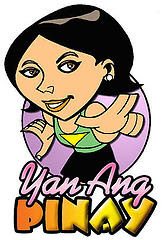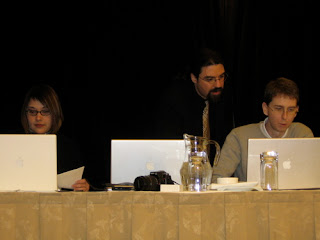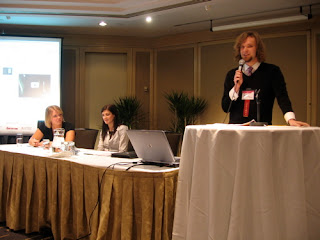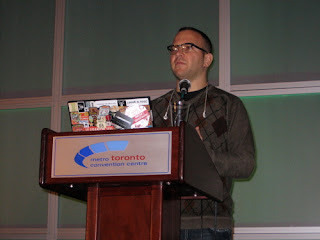It's the start of Lent. In the Philippines, this means that Catholics are expected to go to Mass and walk around with ashes on their foreheads. Those who don't, well, they get asked by their mothers why they didn't go to Mass on a holy day of obligation. Oh, and if they're old enough, they're expected to eat only one meal for the day. No meat, of course.
Anyway, that's just my way of saying that I'll be fasting from blogging starting today. Maybe for a week. Maybe more, maybe less. We'll see. But no, I'm not being religious. Maybe it will be good for all of us =)
Ash Wednesday, Fasting and Blogging
Filipino Librarian is Two Years Old!
It's been two years since my first post, and since I've already commented before on how this blog has achieved its initial objectives and much more, allow me to just share a few statistics about this blog.
Visitors
About 350 every day, goes up to 500 or more on week days, and down to 200 on weekends. Visitors have looked at an average of about two pages per visit since August 2006. My guess is that most visitors access this blog from the office or school. Or they're just too busy to go blog-hopping on weekends. Source: Site Meter.Locations
I don't know why this blog is getting visits from South America, Africa and Russia (!), but if you're from there, thanks for dropping by! Click on the ClustrMap below to see where this blog's visitors live.
 Popular pages
Popular pagesUndoubtedly, the Talumpati posts, followed by the ones about—sshhh—"Sex in the Library," which is not really about sex. The average number of visitors, not to mention pageloads, doubled from June to August 2006 after I began translating speeches into Tagalog. Sex doesn't really get mentioned on this blog very often, but the few posts that do usually get a lot of visits. Knowing that most of this blog's traffic comes from students doing "research," and perverts looking for I-don't-know-what, should I just take the easy way out and cater to their "needs"? =) Source: MyBlogLog.Subscribers
About 400, as seen in the blue "button" on the right, which currently indicates that this blog has 427 "readers." This, however, can be misleading because those who subscribe to this blog's feed may not necessarily always read what I write. They may, in fact, just be looking at the titles to see if they want to read my latest post. But since more than 75 percent of these subscribers signed up for the email feature, then my guess is that these people are very much unlike the "Visitors" mentioned earlier, who find this blog via search engines. Source: FeedBurner.Links
According to Technorati, 1,045 total links, with 381 links from 109 blogs in the last 180 days. According to Google's Webmaster Tools, which is not limited to blogs, 8,763 total links, with more than 75 percent linking to this blog's main page. But since there are probably a lot of duplicate links involved in the counts of both search engines, my guess is that the truth is nearer to the Technorati figure. And the most-linked individual pages? Three Yan ang Pinay posts with 135, 215, and 306 links, respectively.Comments
According to Haloscan, 1,396 comments since May 2005, or about 66 comments per month. But considering that my comments are included in the count, and that comments tend to cluster around certain posts, I'd say that this is one of the areas in which this blog could stand some improvement. If you have any suggestions on how I can encourage visitors to comment, please leave a comment =)Revenue
It used to be that this was the area that needed the most improvement, but since traffic picked up in August 2006, revenue from the ads that most of you probably don't even notice has accelerated such that from earning $100 in 18 months from Google AdSense, this blog earned the next $100 in much less time, and provides hope that $100 per month is possible. I don't know if it was the increased traffic and/or some kind-hearted souls that is/are driving this delightful trend, but I hope it continues! In case you're worried that this blog is going to turn into a money-making scheme, I'd like to assure you that I'll be giving it all back. Watch out for the contest I'll be launching soon!Finally, if you've gotten this far, I'd appreciate it very much if you'd leave some feedback, so that I can learn something about what readers think aside from the nice things that I know my relatives and friends will say =)
Filipina: Yan ang Pinay!
 It's possible that Google's new algorithm, which minimizes the impact of Googlebombing, has had an effect on the Yan ang Pinay (YAP) campaign. But my guess is that after the initial success, YAP fell off the radar of many bloggers. And that's why search results for "filipina" on Google are pretty much back to where they used to be.
It's possible that Google's new algorithm, which minimizes the impact of Googlebombing, has had an effect on the Yan ang Pinay (YAP) campaign. But my guess is that after the initial success, YAP fell off the radar of many bloggers. And that's why search results for "filipina" on Google are pretty much back to where they used to be.
Well, it seems that Filipinas like Zarah ("Yan Ang Pinay! Resurrected") and Grace ("Resurrecting the image of a true Filipina") are not about to give up. So I suppose the men shouldn't give up either.
What can be done? Check out my previous posts (including blocking undesirable ads) and the techniques enumerated at Fabulous Filipinas. But to put it very simply, Filipino women need to identify themselves as Filipina—not just Filipino—and turn the word into a link.
Why? Because the ones who are actively using the word "Filipina" online and turning it into a link—very likely men who view Filipinas as sex objects—are the ones who are causing search engine results to paint an unflattering picture of the Filipina.
Library Student Journal 2:1 (2007)
 The latest issue of Library Student Journal is out. The article on "The underrepresented Native American student" was very interesting considering that I just wrote about diversity in OLA recently.
The latest issue of Library Student Journal is out. The article on "The underrepresented Native American student" was very interesting considering that I just wrote about diversity in OLA recently.The contents of this issue include the following in both html and pdf versions:
Articles
Collaborative tagging, folksonomies, distributed classification or ethnoclassification: a literature reviewEssays
Edith Speller
Carlyle, Panizzi, and the Public Library Ideal
A.S. Popowich
The Dede Korkut digital library: a student project faces the real world
Ozlem Bayram
The underrepresented Native American student: Diversity in Library Science
Monique Lloyd
A new context for knowledge creation: letter from the editor, February, 2007Reviews
Eli Guinnee
Accepting Knowledge Management into the LIS fold: an interdisciplinary approach
Michael JD Sutton
Copyright for Schools: A Practical Guide, 4th ed.
Laura M. Reed
Getting Graphic
Beth Steinbruckner
Legal Solutions in Electronic Reserves and the Electronic Delivery of Interlibrary Loan
David McCaslin
Tips and Other Bright Ideas for Secondary School Libraries: Volume Three
Logan Rath
Disclosure: I'm a member of the Editorial Board.
FO: "Where is Love?" by Lea Salonga
Happy Valentine's Day!
Ok, listen to the song and read the lyrics below, and I suppose it won't be hard to guess that it's not quite a happy day for me. It's snowing and very cold outside. According to the Weather Channel, it's -15 degrees Celsius, but with the windchill factor, it's supposed to feel like -26! And then, of course...
Anyway, it may seem weird to hear Lea Salonga singing, "Where is she..." but just remember that the song is from the musical Oliver! and that the character who sings the song is a young orphan who misses his mother. Salonga goes on to sing "As Long as He Needs Me," but that's probably too much of a victim song for Valentine's Day, so you don't have to watch it, and I certainly won't be putting the lyrics here =)
Where is Love?
Words and Music: Lionel Bart
Performer: Lea Salonga
Where is love?
Does it fall from skies above?
Is it underneath the willow tree
That I've been dreaming of?
Where is she
Who I close my eyes to see?
Will I ever know the sweet "hello"
That's meant for only me?
Who can say where she may hide?
Must I travel far and wide
Till I am beside the someone who
I can mean something to?
Where, where is love?
Every night I kneel and pray
Let tomorrow be the day
When I see the face of someone
Who I can mean something to
Where, where is Love?
Learn About Gabriel Bernardo
at the Gabriel Bernardo Lecture
If you're a student who is looking for a role model, there is no better librarian to emulate than one of the first Filipinos to obtain a degree in library science, and who was held in high esteem by librarians, bibliographers, and historians in the Philippines and the United States.
Rosa Vallejo, former dean of the Institute of Library and Information Science, University of the Philippines—and probably one of the few librarians still around who personally knew Bernardo—will talk about the significance of Bernardo and the contribution he made to Philippine librarianship.
The lecture will be held at the UP Main Library, Diliman, Quezon City, on Wednesday, 14 March 2007, 9:00 a.m. For more information, please call 981-8500 loc. 2869. To read the program, please click on the images below.
Library Hub: Update from an Insider
by Riko Vinluan
This update on Library Hub was provided by the author upon my request.
The Naga Library Hub is working now. Public school libraries have adopted our information system, but I don't know if the system is working at the library level because there is a lack of trained IT staff in DepEd divisions. We are circulating books, but I am very strict with the divisions, especially regarding the circulation of books. I set up a reading program, a concrete project to ensure that the books being circulated will be used in the classroom.
Problems cropped up, however, when the books were distributed to the schools. There were teacher-librarians who, perhaps due to overloading, did not really distribute the books in their schools. The books stayed in their classrooms, and were underutilized. So what I am doing right now is continuing to monitor the use of the books. I believe this is the opportunity to consider the hiring of professional librarians for the public schools.
With the release of funding from the World Bank intended for the Library Hubs, public officials in different parts of the country have begun extolling the virtues of the project. Here's hoping it will not be politicized and that its objective of promoting the use of reading and making every child a reader will be achieved.
Cynthia Aninao — Filipino Librarian
From "Cynthia Aninao had careers as law librarian, nurse" by Rebecca Goodman (Cincinnati Enquirer, 2007):
Cynthia F. Aninao, head of technical services at the Robert S. Marx Library at the University of Cincinnati College of Law, died Sunday of pneumonia at University Hospital... Ms. Aninao recently directed the processing of the 60,000-volume Alfred K. Nippert law book collection, which was donated to the library last year... A native Cincinnatian, Ms. Aninao was the oldest child of Juan and Mariquita Aninao, who immigrated to the United States from the Philippines after World War II.
Wanted: Lecturer in Filipino
(University of Michigan)
Job title: Lecturer in Filipino
Institution: University of Michigan
Location: Ann Arbor, MI
Deadline: 28 February 2007
Contact: Jennifer Eshelman - eshelman-at-umich-dot-edu
This post doesn't quite belong in Job Openings and Career Development because that's really just for librarians. And while it doesn't really belong here, either, I thought it more likely that someone qualified for this position—or someone who knows someone—would see it here.
Do you have to be in the US to apply for the position? Here's their answer: "We are looking for the best possible candidate for this position. If the final candidate turns out to be a non-US Citizen, we will assist them with getting a work eligible visa."
Below is the text of the document that I received:
The Department of Asian Languages and Cultures at the University of Michigan invites applications for the position of Lecturer in Filipino beginning September 1, 2007. The position is a renewable one-year appointment, and is subject to final budgetary approval.
Applicants should have a Master’s degree in a relevant field such as the following: Filipino language, literature, and linguistics; Philippine Studies; second-language acquisition, TESL, education, communications, etc. Native or near-native proficiency in Filipino and English is required; at least one year of experience teaching Filipino at the college/university level is preferred. Duties will include 12 weekly hours of instruction in all levels of Filipino language and active participation in teamwork and program affairs.
The application dossier should include an application letter explaining your qualifications and teaching philosophy, a current CV, and three letters of recommendation. In addition, evidence of teaching excellence, a teaching demo videotape/DVD, and/or samples of self-developed teaching materials would be desirable.
Kindly send your application packet to: Filipino Lecturer Search Committee, Department of Asian Languages and Cultures, University of Michigan, Suite 6111 Thayer Building, 202 South Thayer, Ann Arbor, MI 48109-1608. Review of applications has been extended to February 28 and will continue until the position is filled. The Committee will conduct interviews at the conference of the Association for Asian Studies in Boston and applicants are encouraged to attend.
The University of Michigan is a non-discriminatory/affirmative action employer. Women and minorities are encouraged to apply. Terms and conditions for this position are subject to the provisions of a Collective Bargaining Agreement between the University of Michigan and the Lecturers’ Employee Organization.
OLA 2007: Long-Distance Autographs
It's very rare that famous authors visit the Philippines. But what if fans could actually talk to authors across oceans, and tell them that they wanted their books signed a particular way? Well, it's possible.


The photos above show Leo Yerxa in Ottawa signing Ancient Thunder for librarians in Toronto. The LongPen, conceptualized by Margaret Atwood, has made it possible for her and other authors to interact with fans and sign books without having to ride planes, cross oceans and go on book tours.
This development gives hope that maybe Filipinos will not have to wait years before Neil Gaiman "returns" to the Philippines.
Update on Crash Program
From Dean Faderon: "The Crash Program originally scheduled to start on Feb. 12, 2007 has been postponed to April 16, 2007 for lack of participants."
OLA 2007: Top Trends
 From left: Amanda Etches-Johnson (blogwithoutalibrary.net),
From left: Amanda Etches-Johnson (blogwithoutalibrary.net),
Michael Stephens (Tame the Web), John Blyberg (blyberg.net)
In relation to this, when Michael Stephens found out that so many in the audience were bloggers, he noted that it was almost like "preaching to the choir." Well, if the word "tech" were dropped from "Top Tech Trends," maybe more non-singers would think of joining the congregation =)
There are more observations and photos below, but in case you're not interested in reading further, the top trend for me was the fact that so many bloggers were speakers. And not just at OLA, but other conferences, too. In some cases, the bloggers were already well-known speakers before they even started blogging. But I think the majority started getting invited as speakers because of their blogging. I'm not quite in their league, but that's what happened to me...
Then there was Sophie Brookover (Pop Goes the Library), whose session I wanted to attend because of the subject matter and not because I knew she was a blogger. However, thanks to Murphy's Law, I barely got there for the last five minutes of her talk. It's a good thing she gave me her copy of her slides (pdf) when I approached her at the end of the session.
Next up, the ones I did attend. The "All Conference Event" on "Thu @ 2:15 pm" was supposed to be The Future of Search: Bradley Horowitz, but I guess Horowitz couldn't make it (note: some form of explanation from the organizers would have been nice), that's why Tomi Poutanen, who writes occasionally for the Yahoo! Search Blog, was the one who walked us through "Search and the Emerging Social Web."
What I found most interesting about his session were the stories he told about Yahoo! Answers (Y!A), which seems like it's similar to the now-defunct Google Answers. But the big difference between the two is that Y!A is really a social networking site for information seekers and reference librarian wannabes, while GA was really just a business. What's the future going to be like? It's going to involve a lot of social networking... especially for businesses.

Finally, there was the session shown in the photo at the top of this post. In addition to Stephens, there were Amanda Etches-Johnson, one of the bloggers I looked up to when I started blogging, and John Blyberg, the person responsible for Ann Arbor District Library's award-winning website/blog.
Etches-Johnson made a very good point that Filipino librarians would do well to heed: library websites should NOT be afterthoughts. In many libraries in North America, librarians in charge of the website aren't just "webmasters" anymore but "branch managers." Blyberg, meanwhile, addressed those who feel overwhelmed by the rapid changes taking place now by noting that, "We don't always need to understand the big picture, we just need to know how to be part of it."
And then Stephens started going all over the place—literally—and quoted Karen Schneider: "Open source is free as in kittens, not beer," meaning that kittens need to be taken care of AND they turn into cats. Open source doesn't go down as easily as beer, but it's getting easier to use.
The photos below are ones taken by Stephens from the podium (!) at both of the sessions I attended. Click on them to see the originals. Leave a comment if you see me =)


Reading Matters
If you would like to read about what other bloggers have written in the past few days that are not necessarily related to the convention, you should read the following:
It is commonly believed that humans have basic needs—food, water, shelter. However, I beg to differ if that is merely enough. They are all we require to survive perhaps but we need more to be human: we need companionship, we need work, we need something to pass the time... For me, reading a book is one such need: it does not have the same urgency as food, drink, and shelter, and by no means does every human being depend on the ability to read books to survive. But for certain people, reading a book is surely a necessity they can’t live without or else they will end up living a life that is less than human.John Silva criticizes Bench's Wear Your Conscience campaign in "There's a Typo on the Bench Billboard":
If the use of billboards to hawk a cause isn’t egregious enough, the more nauseating aspect of the campaign is the insensitivity of the “Conscience” message to the reality at hand. Sa Aklat Sisikat, like other education reform organizations, valiantly works to make more children read through teacher training and the distribution of books at the Grade Four Level... Aklat Sisikat’s work is so serious and formidable that the billboard images of slouched and pampered individuals reeking of privilege dreamily exhorting working people on buses and the MRT plying EDSA to go get a conscience is surreal, obscene, arriviste, and deepens the already tenuous class divide even further.Finally, Ruby Ann Kagaoan-Calo explains in "Reading and a Sense of Nation" just why reading is important and that kids can be taught how to read better:
...some parents in the school where my other child is attending had noticed how my child would just quietly sit down, read a book, and she would finish it quickly and get another one...Now, if only all these bloggers would join the Get Caught Reading campaign =)
And a number of parents had noticed it, and they were saying, "Sana gan’un yung anak namin." (How we wish our child is like your child.)
And I told them, "She’s doing some techniques."
"Techniques?! Meron bang techniques sa reading?" (Are there techniques in reading?)
"Yes, there are."
OLA 2007: Does OLA Care About Diversity?
Thu @ 10:40 am
Librarianship as a Profession
Recruiting for Diversity: Affirmative Action and Academic Librarians
Mary Kandiuk
Of all the sessions that I attended, this one had the least number of participants, but it also had the most significant effect on me.
I like Canada because, among other things, it is very multicultural. Unlike other cities I've visited in the past year, the chances of overhearing conversations in a Philippine language in the subway are very high. I was also pleasantly surprised to find very good Philippine collections in the academic and public libraries I've been using in Toronto.
But it was not until a librarian from Tibet pointed it out to me before the conference officially began that I realized just how "white" OLA was. The same observation would be repeated by Kandiuk, and extended to the photos of speakers found in the conference program.
However, what really stuck with me was an anecdote related by Kandiuk about an email she sent to a listserv about starting a discussion on affirmative action. How many people replied? Two. And how many were there for the session? Seven, including the convenor and the speaker.
Kandiuk proposed several reasons for the seeming indifference—including ambivalence about the subject, reluctance about saying the wrong thing, lack of relevance to the majority's needs, and perhaps only minority librarians are interested—but since no studies have been done, she couldn't really say which one was causing the lack of dialogue regarding the lack of diversity among librarians.
True, OLA offers an aboriginal student scholarship, but it's not the same as pushing affirmative action or even close to ALA's Office for Diversity or the Joint Conference of Librarians of Color (see notes taken by The Gypsy Librarian). And while OLA deserves credit for the existence of the session I attended, I've been told that it almost didn't happen.
The OLA referred to in the title of this post is not directed just to its leadership, but its members, too. The title is in the form of a question because I would like to start a conversation. It is my hope that this post will receive more than the two replies that Kandiuk got to her listserv email.
OLA 2007: Questions About Online Users,
YouTube, Facebook and MySpace

The first session I attended asked the question "How Well Do You Know Your Patrons?" in a non-traditional format, while the questions asked during the second session I went to unwittingly provided an answer within its very traditional format. Take a look at the photos below, read my observations, and "see" what I mean =)

Session #200
Thu @ 8:00 am
All Conference Event
How Well Do You Know Your Online Users?
Welcome to Our Game Show. Bring Your Cell Phone.
From left: Ken Roberts, Cynthia Archer, Liz Kerr, Michael Ridley

Session #324
Thu @ 9:05 am
I've Looked at Clouds from Both Sides Now
From left: Alison Drain, Patricia Horak, Zachary Abram
 The first had former OLA presidents participating in a game patterned after a newish show; the second had speakers below 25 years old with a session named after an old Joni Mitchell song. It was good because it showed that the veterans are still young enough to have fun (note: look at Ridley's shoes in photo on the right), and the young ones are mature enough to care about songs they're not even expected to know.
The first had former OLA presidents participating in a game patterned after a newish show; the second had speakers below 25 years old with a session named after an old Joni Mitchell song. It was good because it showed that the veterans are still young enough to have fun (note: look at Ridley's shoes in photo on the right), and the young ones are mature enough to care about songs they're not even expected to know.But aside from the obvious differences that can be gleaned from the photos and titles, I thought the questions that were un/asked were more significant. There wasn't really time for questions during the first session, but it would have been good to have a definitive answer to the game show's central question. It was also very telling, in my opinion, that the young librarian who explained how to send text messages said that RSS is "like instant messaging but you can attach media files."
Meanwhile, the participants at the session on YouTube, Facebook and MySpace asked many questions, most of which concerned privacy and how kids can be protected from predators. No one asked about how social networking sites can be used to promote libraries. Perhaps the speakers should have led the way. Maybe I should have posed the question myself. But I think the answer to "How Well Do You Know Your Patrons?" would be more accurate if a lifeline were used—"Ask the Audience."
OLA 2007: Live-blogging Update
Just in case any of you took my statement regarding live-blogging seriously (i.e., "consider yourself warned"), I'm going to have to delay my posts because the wifi access I was counting on doesn't seem to be working at the convention center and I'm too tired now to put my notes and photos in order.
In the meantime, check out the OLA Super Conference 2007 blog.
OLA 2007: Boing Boing's
Cory Doctorow on Copyright
 Session #100
Session #100
Wed @ 8:00 pm
All Conference Event
Opening Plenary: Cory Doctorow
Cory Doctorow was introduced as an editor of Boing Boing, a science fiction novelist whose works can be downloaded via Craphound.com and is one of Forbes.com's Web Celeb 25.
I took notes, but since it's late and I still have to get up early for tomorrow's sessions—and Confessions of a Science Librarian has already posted his notes—I'll just let you hear and read what Doctorow has said at other venues:
"Cory Doctorow - Cool Geek of the Week" (bornrich.org, 27 January 2007)His talk was engaging and enlightening, but it would be have been much better if he had slides or webshots for those who had no idea what he was referring to. Here, for the benefit of those interested, are links to some of the sites/ideas he mentioned:
"Giving It Away" by Cory Doctorow (Forbes, 1 December 2006)
"What's the Point of Copyright?" (mp3; 16 November 2006)
Flickr: Decay
Distributed Proofreaders
Internet Archive's Bookmobile
Spamigation: automated litigation



